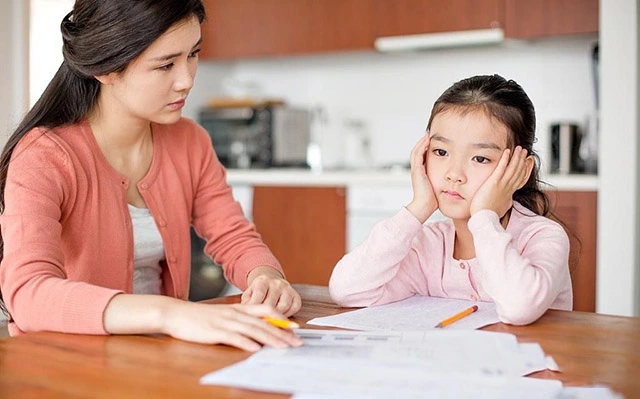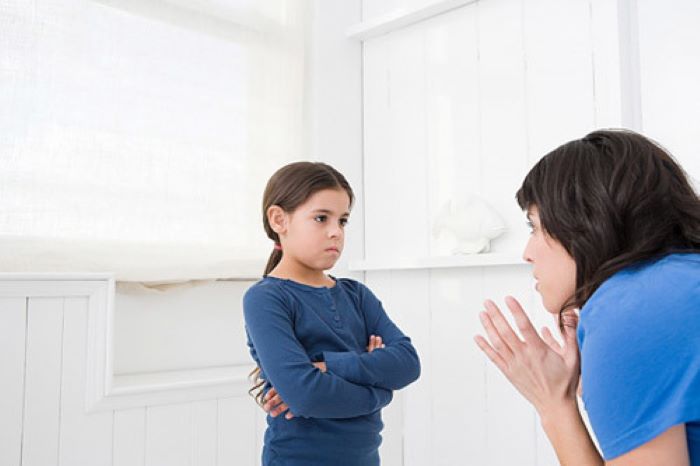Moreover, parents often say these 5 sentences admit failure in child rearing when they cannot force their children to listen and say words that hurt them.
1. “You’re too dumb, you can’t do anything”
Child’s thinking: “I am a failure”.
When a child is called dumb, they will label themselves with that phrase. Many parents say things like this when they are angry, thinking it is just criticism or simple mockery. They think it helps them release their emotions, but they do not know how much their child will be hurt.

Illustrative image
Sometimes, parents say this phrase just to vent their frustration, using adult authority to scold their children. However, the consequences will make the child lack self-confidence, doubt themselves, and even feel that their parents no longer love them or show them any affection.
Saying this sentence also shows helplessness and failure in educating children. It is best when angry, parents should calm down. Before making accusations, put yourself in your child’s shoes. The fact that children have to develop fears is the cause of a cracked relationship between parents and children.
2. “I don’t care about you anymore, do whatever you want”
Child’s thinking: “I’m not good, my parents don’t need me”.
In a supermarket, a boy held a toy in his hand, tears welled up in his eyes as he pleaded with his mother. The mother looked up and looked at the price on the shelf, frowning. The expenses for this month have exceeded the budget, unable to spend money on pointless toys like this. She promised the child that she would buy it next time, but the 5-year-old knew that his mother was lying. The boy burst into tears.
The crying of the child quickly attracted the attention of the employees and many passers-by. Seeing the stubborn child, the mother finally “won” by threatening: “I’ll count to 3. If you don’t put down the toy, I won’t let you go home”. Hearing this, the child immediately stopped crying.
Regarding the mother’s behavior, if you analyze it from a long-term perspective, you will find that although financial losses can be avoided, this education method will have a bad impact on the child’s character.
3. “You will end up being a garbage collector because you’re not studying”
Child’s thinking: “I’m so bad”.
“Aronson effect” in psychology refers to a negative attitude gradually when rewards decrease and a positive attitude gradually when rewards increase. Encouragement and affirmation from parents are the greatest rewards for them.

Illustrative image
The more rewards like this, the more the child will progress, on the contrary, the more negative comments, the easier the child will see that as their own label, from “maybe I can’t do it” to “I really can’t do it”.
4. “Why aren’t you as good as others?”
Child’s thinking: “I’m not as good as others and I’m always bad in my parents’ eyes”.
In the eyes of many parents, other children are obedient, understanding, and good at studying. They read books every day and never play with mobile phones, go to bed early and wake up early, and do housework.
To children, “other people’s children” is not a goal to strive for, but more like a curse that will only cause endless pressure.
Each child has their own journey of growth. Instead of using comparison to make children feel inferior, sensitive, and competitive, it is better to accept their true selves and let them shine on their own stage.
5. “I don’t know why I had a child like you”
Child’s thinking: “My parents don’t want me to be born”.
When saying this sentence, do parents think about how much they longed for and loved their child when they were newly born? A child on the path to maturity must go through many stages, including psychological crises. When the child faces difficulties and failures, if parents blame them like this, how can they be brave enough to face the difficulties outside?

Illustrative image
This sentence is hurtful not only to the child but also to others who hear it. Feeling redundant, not being valued by parents, and being compared unfavorably to siblings and friends are all very terrible. Being a good parent does not mean that the child has to be like that and vice versa. So instead of blaming parents, guide and give appropriate advice to children.
When angry, try to restrain and keep calm. Words spoken in anger often hurt others immensely. Especially with children, they deserve to hear words of love rather than reprimands and scolding.





































